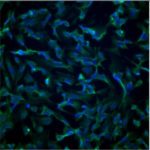Lien vers Pubmed [PMID] – 31791394
Clin Epigenetics 2019 12;11(1):174
The flexibility of the epigenome has generated an enticing argument to explore its reversion through pharmacological treatments as a strategy to ameliorate disease phenotypes. All three families of epigenetic proteins-readers, writers, and erasers-are druggable targets that can be addressed through small-molecule inhibitors. At present, a few drugs targeting epigenetic enzymes as well as analogues of epigenetic modifications have been introduced into the clinic use (e.g. to treat haematological malignancies), and a wide range of epigenetic-based drugs are undergoing clinical trials. Here, we describe the timeline of epigenetic drug discovery and development beginning with the early design based solely on phenotypic observations to the state-of-the-art rational epigenetic drug discovery using validated targets. Finally, we will highlight some of the major aspects that need further research and discuss the challenges that need to be overcome to implement epigenetic drug discovery into clinical management of human disorders. To turn into reality, researchers from various disciplines (chemists, biologists, clinicians) need to work together to optimise the drug engineering, read-out assays, and clinical trial design.

